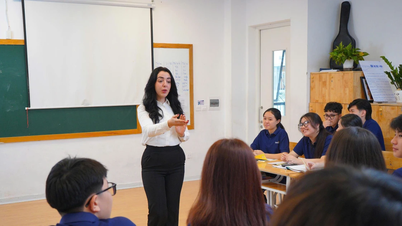REAL-LIFE COLLISIONS
Three years ago, armed with a veterinary science degree, Pham Thi Thanh Truc (28 years old, from Vinh Long province) left Vietnam for Japan hoping for a better life. Her initial expenses for the trip were nearly 180 million VND, not including tuition, living expenses, and a few thousand USD in brokerage fees. However, the paradise was not as advertised.
"My job is milking cows and cleaning barns, starting at 5 a.m. and finishing when the work is done. My monthly salary is about 180,000 yen (10,000 yen), equivalent to 32 million VND. After deducting about 6 million VND in taxes, rent, and living expenses, I'm left with only about 10 million VND. However, I live in a mountainous area, so I don't spend much. If I lived in the city, I probably wouldn't have any money left over," Ms. Truc confided.

Nursing is one of the fields that many students choose for vocational training abroad.
PHOTO: YEN THI
According to Ms. Truc, opportunities to earn money in Japan do exist, but only if you are willing to make sacrifices and work hard: working nights, constant overtime, and little time for rest. "In reality, companies often exaggerate salaries. Once you come here, you know that earning money is not easy," she said.
After nearly two years of preparing the necessary procedures and studying foreign languages in Vietnam, Nguyen Minh Chinh (20 years old, from the former Quang Binh province , now Quang Tri province) is studying nursing in Germany. Although he only arrived in July of this year, Chinh quickly felt the weight of vocational training abroad.
"I study 8 hours a day, and the curriculum is quite demanding, so I haven't had time to work part-time. The initial cost to study in Germany was about 200 million VND. In the first year, I was paid 1,350 euros (about 38 million VND) per month, before taxes, rent, insurance, etc. After all the deductions, it was enough to live on. If I wanted to go for coffee, I could only do it once or twice a month; going out more often would mean I wouldn't have enough money to cover the expenses," Chinh shared.
Studying vocational training in Germany is not easy. The biggest difficulty, according to Chinh, is the language. "If you're not good at the language, everything is difficult. From studying to finding part-time work, everything is a problem," Chinh said.
Nguyen Thi Ut Thuong (27 years old) graduated with honors in English language studies. Wanting to gain experience abroad, she applied for an agricultural internship program in Denmark. "One of the biggest challenges was the language and cultural barrier. Differences in culture, work methods, and lifestyles also required a high level of adaptability. Manual labor required good health and the ability to withstand harsh working conditions and cold weather in Denmark," she shared.

Numerous online advertisements for studying in Germany.
PHOTO: SCREENSHOT
BEHIND THE "HUNDRED MILLION VIETNAMESE DONG" ADVERTISEMENT
In recent years, the phrase "vocational training abroad with a salary of hundreds of millions of VND" has been heavily advertised on social media, consulting company websites, and even in student and parent groups. These companies often paint a rosy picture: free vocational training, accommodation and living expenses, and immediate employment upon graduation with a monthly income of 50-80 million VND, with some even claiming hundreds of millions of VND.
According to Ms. Vu Hong Thuy of the German Chamber of Industry and Commerce in Vietnam (AHK), vocational training abroad opens up many opportunities, but it is not an easy ticket to a better life.
Most advertisements for salaries in the hundreds of millions of dong (Vietnamese Dong) usually do not deduct personal income tax and social security contributions (brutto), or they represent salaries in certain industries or localities; not all professions or all workers can immediately reach that level. "The average salary for recent graduates of vocational training programs (Ausbildung) is usually in the tens of millions of dong. Salaries in the hundreds of millions of dong are typically only for workers in certain industries, with appropriate qualifications and skills, working as skilled laborers with practical work experience," Ms. Thuy added.
Furthermore, the tuition fee waiver only applies to formal vocational training programs in Germany (Ausbildung); students still have to cover their own living expenses: accommodation, transportation, insurance, administrative costs, etc. All these expenses mean that the actual remaining balance is not as high as expected.
One factor that shatters many people's illusions is the difference between gross (before tax) and net (after tax) salaries. "After deducting income tax, health insurance, unemployment benefits, etc., the actual income decreases significantly. Living in a big city is even more expensive. So, a salary of a thousand euros sounds attractive, but it doesn't mean you can save money right away," Ms. Thuy said.
Ms. Thuy also warned of risks from unreliable consulting companies: false advertising, inflated fees, and even sending the wrong people to consulting firms. "If possible, do your own research through official channels to avoid risks. Especially, check the legality and reputation of the consulting company you entrust your business to," she advised.
Sharing the same view, Ms. Luu Thi Ngoc Tuy, Chairwoman of the Board of Directors of Vilaco Group, said that many families spend a lot of money hoping for quick results, but the results are not substantial. "The market is still complex. It's difficult for businesses to operate honestly because some companies send the wrong people, even illegally, or advertise falsely, affecting the overall reputation," she stated.

To study nursing in Germany, you need a minimum German language proficiency level of B1.
PHOTO: YEN THI
PREPARATIONS FOR MAKING A LIVING ABROAD
From a training perspective, Ms. Phan Thi Le Thu, Vice Principal of Vien Dong College, believes that the language barrier is the biggest challenge. "Even with a B1 certificate in Vietnam, communication in Germany is still difficult because listening and speaking skills only reach about 40%. In reality, achieving B2 is the safe standard, but very few Vietnamese students pass the B2 exam before leaving," Ms. Thu said.
According to Ms. Ngoc Tuy, the most important skill that Vietnamese students need to prepare when studying vocational courses abroad is foreign language proficiency. In reality, Vietnamese students often lack competitiveness compared to international students due to a lack of foreign language skills.
Based on practical experience, Ms. Hoang Van Anh, General Director of An Duong Group (the unit currently implementing the VJC project - sending workers to Japan with zero service fees), shared that language and cultural differences are the biggest obstacles for students when pursuing vocational studies abroad. In addition, there are differences in work ethic and discipline. "The most common mistake is not thoroughly researching the program, choosing an unreliable sending agency, leading to unnecessary expenses or insufficient preparation in terms of documents, language, and skills. Furthermore, many students have the mindset of working to earn money quickly without clearly defining their vocational training and long-term development goals, so they easily encounter difficulties, or even drop out midway," Ms. Van Anh analyzed.
According to Ms. Van Anh, high-paying jobs are often demanding, such as nursing, food processing, and construction.
Language requirements and recruitment
Ms. Hoang Van Anh stated that the differences in vocational training requirements between countries are also an important factor for students to consider.
In Germany, applicants must have a minimum German language proficiency level of B1 to apply for a visa, but no entry-level vocational skills are required. Meanwhile, Japan requires a minimum Japanese language proficiency level of N5, with nursing requiring N4-N3; students do not need prior vocational skills but must cover tuition fees and provide proof of financial resources. Similarly, South Korea requires Korean language proficiency from TOPIK level 2-3 or higher, does not require vocational skills, but students must also cover their own tuition fees and provide proof of financial resources.
Regarding recruitment needs, Germany currently lacks approximately 200,000 workers in the nursing and healthcare sector, over 160,000 in the technical and industrial sectors (mechanical, electrical, automotive, etc.), and about one-third of the positions are vacant in crafts such as refrigeration and construction. In Japan, the nursing and elderly care sector alone is projected to face a shortage of 250,000 workers by 2026, potentially increasing to 570,000 by 2040, along with significant demand in the food and catering sectors. South Korea, meanwhile, frequently experiences shortages of young workers, particularly in manufacturing, electronics, service industries, and seasonal agriculture.
Source: https://thanhnien.vn/du-hoc-nghe-co-that-mau-hong-185251027201329183.htm






![[Photo] Two flights successfully landed and took off at Long Thanh Airport.](/_next/image?url=https%3A%2F%2Fvphoto.vietnam.vn%2Fthumb%2F1200x675%2Fvietnam%2Fresource%2FIMAGE%2F2025%2F12%2F15%2F1765808718882_ndo_br_img-8897-resize-5807-jpg.webp&w=3840&q=75)







































































































Comment (0)